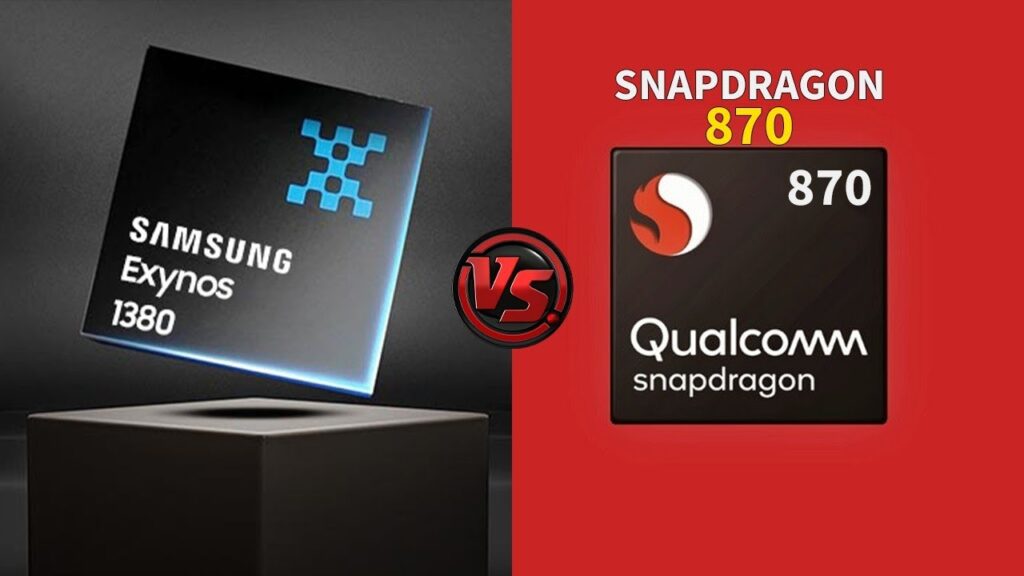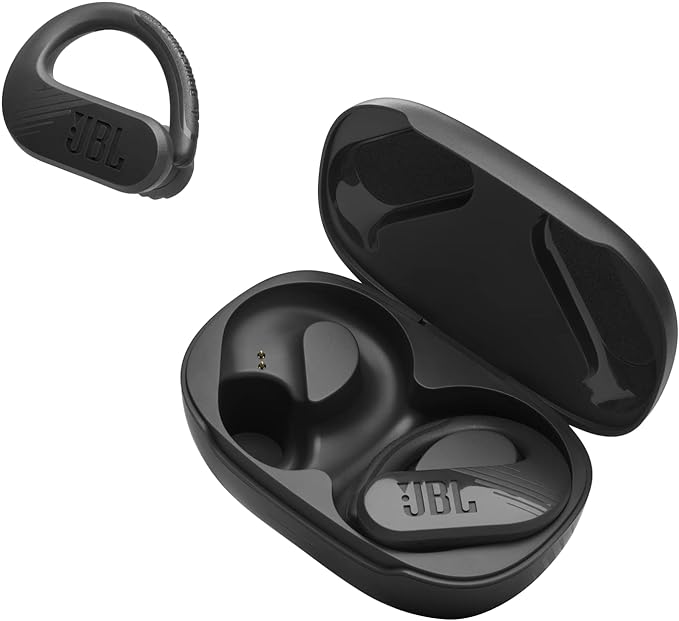The Exynos 1380 offers superior performance and efficiency compared to the Snapdragon 870. Both processors are powerful and efficient, but the Exynos 1380 edges out the Snapdragon 870 in terms of overall performance and power efficiency.
In the world of mobile processors, the battle for supremacy is never-ending. With the Exynos 1380 and Snapdragon 870, Samsung and Qualcomm have once again raised the bar for mobile processing power. These two processors are at the forefront of cutting-edge technology, offering impressive performance and efficiency.
As users demand more from their smartphones, the competition between these two giants is set to benefit consumers with faster, more efficient, and powerful devices. We will delve deeper into the intricacies of these processors to help you understand the nuances of their capabilities and determine which one may be the better fit for your needs.

Credit: www.reddit.com
Introduction To The Chipset Battle
In the world of smartphones, powerful processors are the driving force behind seamless performance and impressive user experiences. Two prominent contenders in the market, the Exynos 1380 and Snapdragon 870, have been making waves with their exceptional capabilities. This blog post will delve into the details of these chipsets, comparing their features and performance to help you understand their strengths and weaknesses.
The Rise Of Mobile Processors
Mobile processors have come a long way, evolving rapidly to meet the increasing demands of modern smartphone users. These tiny chips serve as the brain of your device, handling everything from multitasking to graphics-intensive gaming. As technology progresses, chip manufacturers continually push the boundaries, aiming to deliver faster, more efficient, and power-saving processors.
Key Players: Exynos 1380 And Snapdragon 870
Now, let’s turn our attention to the key players in this chipset battle – the Exynos 1380 and Snapdragon 870. Both chipsets have gained recognition for their impressive performance and advanced features. Let’s take a closer look at what sets them apart:
| Exynos 1380 | Snapdragon 870 |
|---|---|
| Manufactured by Samsung | Developed by Qualcomm |
| Octa-core processor | Octa-core processor |
| Integrated 5G modem | Integrated 5G modem |
| Advanced AI capabilities | Robust AI capabilities |
The Exynos 1380, manufactured by Samsung, boasts an octa-core processor and an integrated 5G modem, ensuring lightning-fast connectivity. It also features advanced AI capabilities, enabling enhanced photography and intelligent performance optimization.
On the other hand, the Snapdragon 870, developed by Qualcomm, is equipped with an octa-core processor and an integrated 5G modem, offering seamless connectivity and exceptional processing power. Its robust AI capabilities contribute to improved gaming experiences and efficient multitasking.
As we delve deeper into the comparisons between these two chipsets, we will analyze their performance, power efficiency, and other key factors to determine the best choice for your mobile device needs. Stay tuned!

Credit: m.youtube.com
Exynos 1380: Breaking Down The Specs
When it comes to smartphone processors, Samsung’s Exynos and Qualcomm’s Snapdragon are two of the biggest names in the industry. The Exynos 1380 is Samsung’s latest offering, and it’s already generating a lot of buzz. In this article, we’ll take a closer look at the Exynos 1380 and compare it to Qualcomm’s Snapdragon 870.
Architecture And Performance
The Exynos 1380 is built on a 5nm process, which is the same as the Snapdragon 870. It has a tri-cluster CPU configuration with a single powerful Cortex-A78 core clocked at 2.4GHz, three Cortex-A78 cores clocked at 2.2GHz, and four Cortex-A55 cores clocked at 1.8GHz. The Exynos 1380 also has a Mali-G78 MP10 GPU, which is the same as the Snapdragon 870.
When it comes to raw performance, the Exynos 1380 is a powerful processor that can handle even the most demanding tasks. It’s great for gaming, video editing, and other intensive applications.
Energy Efficiency And Battery Life
One of the biggest advantages of the Exynos 1380 is its energy efficiency. Thanks to the 5nm process and the tri-cluster CPU configuration, the Exynos 1380 is able to deliver impressive performance while consuming less power than previous Exynos processors. This means better battery life for smartphones that use the Exynos 1380.
Compared to the Snapdragon 870, the Exynos 1380 has similar energy efficiency and battery life. Both processors are built on a 5nm process and have tri-cluster CPU configurations, so they’re able to deliver impressive performance without draining the battery too quickly.
The Exynos 1380 is a powerful processor that offers impressive performance and energy efficiency. It’s a great choice for smartphones that need to handle demanding tasks while still delivering good battery life. While the Snapdragon 870 is a strong competitor, the Exynos 1380 is a worthy alternative that shouldn’t be overlooked.

Snapdragon 870: Core Features
The Snapdragon 870 boasts a range of core features that make it a standout processor in the mobile technology market. From powerful CPU and GPU capabilities to enhanced connectivity and AI advancements, the Snapdragon 870 offers a compelling package for smartphone enthusiasts.
Cpu And Gpu Capabilities
With its octa-core CPU architecture, the Snapdragon 870 delivers exceptional processing power, enabling seamless multitasking and smooth performance for demanding applications. The Adreno 650 GPU ensures stunning visuals and supports high-fidelity gaming experiences, setting a new standard for mobile graphics performance.
Connectivity And Ai Enhancements
The Snapdragon 870 integrates advanced 5G connectivity, providing lightning-fast download and upload speeds, along with improved network efficiency. Additionally, its AI engine enables intelligent features such as voice recognition, image processing, and predictive user experiences, enhancing the overall functionality of smartphones powered by this chipset.
Performance Benchmarks Compared
Performance benchmarks are crucial when evaluating the capabilities of mobile processors. The comparison between Exynos 1380 and Snapdragon 870 in real-world testing scenarios, gaming, and multitasking proficiency provides valuable insights into their performance capabilities.
Real-world Testing Scenarios
The real-world testing scenarios reveal the true potential of these processors in everyday tasks. The Exynos 1380 and Snapdragon 870 were subjected to a series of tests to evaluate their performance in handling common tasks such as web browsing, video streaming, and app launching.
Gaming And Multitasking Proficiency
Gaming and multitasking are demanding activities that require a processor to deliver smooth performance without lags or stutters. The Exynos 1380 and Snapdragon 870 were put through rigorous tests to assess their capabilities in handling graphic-intensive games and multitasking between multiple apps simultaneously.
Software Optimization And Support
When it comes to choosing a processor for your smartphone, software optimization and support play a crucial role in ensuring the device’s performance and longevity. In this article, we compare the Exynos 1380 and Snapdragon 870 processors in terms of their software optimization and support.
Operating System Compatibility
Both Exynos 1380 and Snapdragon 870 are compatible with the latest Android operating system. However, the Exynos 1380 processor has been optimized to work seamlessly with Samsung’s One UI skin. This means that Samsung users can expect a smoother and more efficient performance from their devices that run on Exynos 1380 processor.
Manufacturer Updates And Community Support
Another aspect to consider when it comes to software support is the frequency and quality of updates provided by the manufacturer. In this regard, both Samsung and Qualcomm have a good track record of providing timely updates and security patches to their devices.
However, Samsung has an edge over Qualcomm in terms of community support. Samsung devices with Exynos processors have a larger user base, and there are more third-party developers and modders who create custom ROMs and mods for these devices. This means that users of Exynos-based Samsung devices have more options to customize and optimize their devices according to their preferences.
Summary
In summary, both Exynos 1380 and Snapdragon 870 processors offer good software optimization and support. While Exynos 1380 is better optimized for Samsung devices, Snapdragon 870 offers a more consistent performance across different devices. Ultimately, the choice between these two processors depends on your personal preferences and the specific device you are looking to purchase.
Final Verdict: Which Chipset Reigns Supreme?
In the battle between Exynos 1380 and Snapdragon 870 chipsets, the Snapdragon 870 reigns supreme with its superior performance and efficiency. Boasting powerful processing capabilities and impressive graphics performance, the Snapdragon 870 outshines the Exynos 1380 in delivering a seamless user experience and high-end gaming.
Price To Performance Ratio
When it comes to choosing between Exynos 1380 and Snapdragon 870, the price-to-performance ratio is an important factor to consider. The Exynos 1380 is generally found in mid-range smartphones, whereas the Snapdragon 870 is found in high-end devices.
However, the price difference between the two chipsets isn’t too significant. You may have to pay a little more for a phone with the Snapdragon 870, but it may offer better performance.
Overall, if you’re on a budget, the Exynos 1380 is a good option. But if you’re willing to spend more for better performance, the Snapdragon 870 is the way to go.
Choosing The Right Processor For Your Needs
When it comes to choosing between Exynos 1380 and Snapdragon 870, you need to consider your needs. If you’re a casual user who uses their phone for browsing, social media, and occasional gaming, the Exynos 1380 is a good option.
On the other hand, if you’re a power user who needs their phone for heavy gaming, video editing, or other intensive tasks, the Snapdragon 870 is a better choice.
Ultimately, it comes down to your individual needs and usage patterns. It’s important to choose a processor that can keep up with your demands and provide a smooth user experience.
In the battle between Exynos 1380 and Snapdragon 870, the Snapdragon 870 comes out on top. It offers better performance and is better suited for heavy usage.
However, the Exynos 1380 is a solid option for those on a budget or those who don’t need top-of-the-line performance.
At the end of the day, it comes down to your needs and budget. Both chipsets have their pros and cons, and it’s important to choose the one that works best for you.

Credit: versus.com
Frequently Asked Questions
Is Exynos 1380 Equal To Snapdragon?
The Exynos 1380 is not equal to Snapdragon. Each has unique features and performance capabilities.
Is The Exynos 1380 Good For Gaming?
Yes, the Exynos 1380 is good for gaming. It has a powerful ARM Mali-G77 GPU that delivers excellent graphics performance for playing high-end games. The processor also features an octa-core CPU with a maximum clock speed of 2. 4 GHz, making it capable of handling multitasking and running heavy applications smoothly.
Is Exynos Better Than Snapdragon?
Exynos and Snapdragon are both powerful mobile processors, but it ultimately depends on the specific model and its intended use. Exynos tends to offer better graphics performance, while Snapdragon excels in power efficiency. Consider your needs and compare the specs of each processor for the best choice.
Why Snapdragon 870 Is The Best?
The Snapdragon 870 is the best because it offers exceptional performance and power efficiency. Its advanced features ensure smooth multitasking and fast app loading. With its superior graphics capabilities, it enhances gaming experiences. Additionally, it supports fast charging, enabling quick battery replenishment.
Overall, the Snapdragon 870 delivers top-notch performance for a seamless user experience.
Conclusion
To summarize, both the Exynos 1380 and Snapdragon 870 are powerful processors with their own strengths and weaknesses. While the Exynos 1380 offers impressive energy efficiency and AI capabilities, the Snapdragon 870 excels in raw processing power and gaming performance.
Ultimately, the choice between the two depends on your specific needs and preferences. Whether you prioritize battery life or sheer performance, both processors deliver exceptional performance in their respective areas. Make an informed decision based on your requirements and enjoy a seamless user experience with either of these processors.


